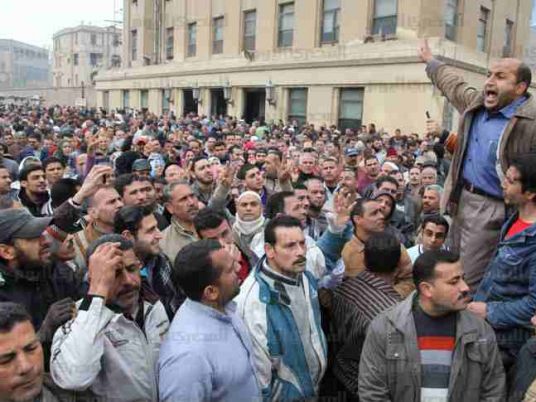
Hundreds of Port Said merchants ended on Monday evening their sit-in staged at the intersection of Mohamed Ali and Al-Thalatheeny streets in the city, protesting against the province’s economic situation. They also called on government to take measures that renew the free trade zone.
The merchants opened their stores allowing flow of traffic, which was halted since the sit-in was staged.
Sources revealed that division and exchange of accusations among protesters as well as security pressures caused ending of the sit-in that lasted for two days causing traffic congestion.
Before staging the sit-in, the merchants staged a large march that was organized by the Port Said merchants coalition, which is a non-official group of merchants who do not recognize the city’s Chamber of Commerce board, as they say it is reluctant to protect them.
On the eve of the sit-in, Major General Magdy Nassr Eddin, the governor, called on Yehia al-Gebaly, coordinator of the coalition, to join the delegation of the chamber that will meet the prime minister and finance minister to tackle problems of the free trade zone. However, Gebaly conditioned that the chamber’s delegation be replaced by non-official representatives of the merchants, which the governor refused. Nassr Eddin and members of the chamber then met with Prime Minister Ibrahim Mehleb before the sit-in was declared. The meeting ended announcing a reduction of customs imposed on goods of the free trade zone by 25 percent, reduction of fees of services and those of the executive authority by 25 percent, disbursing pensions and including the merchants within the health insurance system.
However, the coalition rejected Mehleb’s decisions and called for the protest that was staged on Sunday from Marium mosque and ended with declaring the sit-in. Hundreds of parliamentary candidates joined the sit-in and gave speeches, amid negotiations that the security department conducted to open the road for traffic.
On Monday, a delegation of the merchants headed to meet with ministers of finance and trade. The coalition then declared approval of the ministers on more reductions of the fees and taxes on imported goods, without reducing customs on them and disbursing unemployment allowance. However, some merchants were skeptic about what the coalition declared causing division among them. The sit-in was then ended.
Leftist figure Al-Badry Farghaly said that the government turned all the provinces to free trade zone and into a big market for imported goods with low quality. “How can we find sneakers sold on street at LE100, while its price at its original country reaches LE1,000?” he wondered.
Commenting on Mehleb’s promise to allocate LE200 million for development of Port Said, Farghaly said that sum is not enough to pave roads. “We've gotten used to government’s promises as former PM Atef Ebeid promised in 2002 to allocate LE16 billion for Port Said without fulfilling his promise,” he said.
Exchange expert Mamdouh Gabr said that the free trade zone ended after the General Agreement on Tariffs and Trade was applied. Port Said relatively lossed its advantage after other provinces were allowed to import clothes.
Port Said was decreed a free trade zone by late President Anwar Sadat in 1976 to boost the city economically, but former President Hosni Mubarak canceled the decree in September 1999, following allegations of an assassination attempt by a city resident. The city was then declared a free trade zone again during President Mohamed Morsy in 2013.
Ahmed Fouad, a merchant, said, “We no more find visitors to the city. Our client is from the city.They only buy on special occasions and holidays. Moreover, the prices are going higher.”
Ali Mostafa, another merchant, said, “We now buy the goods as wholesale from Qantara and sell it as retail in Port Said, because they are cheaper than those at the wholesalers of Port Said.”
Youssef Azzam, former member of board of the chamber of commerce, said, “Port Said merchants were able to make their problems heard by officials. The sit-in achieved them good benefits, despite being a beginning not an end.”
Edited translation from Al-Masry Al-Youm




